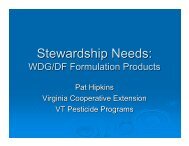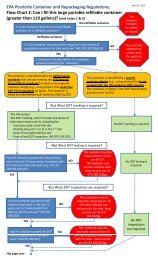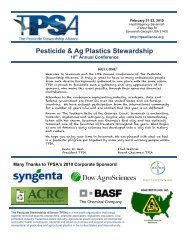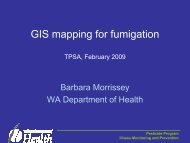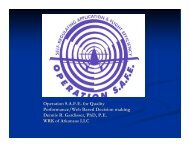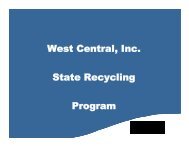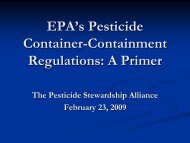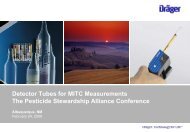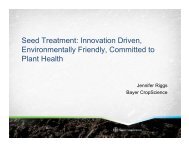Clean Sweep Programs - US Environmental Protection Agency
Clean Sweep Programs - US Environmental Protection Agency
Clean Sweep Programs - US Environmental Protection Agency
- No tags were found...
Create successful ePaper yourself
Turn your PDF publications into a flip-book with our unique Google optimized e-Paper software.
Section 5 Observations5.3 Reliable estimates of uncollectedpesticides are elusive.No one knows how many pounds ofunwanted pesticides remain uncollected in the U.S.,and accurately estimating the total amount is difficultdue to several factors. First, many farmers arereluctant to fill out government surveys, particularly ifthey happen to have canceled pesticides stored intheir barns. Some people may fear that a survey,even if anonymous, may be tracked back to themand that they might be subject to a fine or penalty.Second, some stocks lie forgotten in barns for yearsuntil the owner dies and the barn is bought orinherited by someone who does not need thepesticides and wants to get rid of them. Third,unwanted pesticides continually accumulate. Ideally,all pesticides bought in a single year would be usedduring that year’s growing season. In reality, someamount may be left over every year and many neverbe used, if farmers change crops or need differentpesticides. Fourth, in recent years, some uses ofolder products have been canceled due to new riskassessments conducted under the Food Quality<strong>Protection</strong> Act. In such cases, a farmer may choosenot to use existing stocks of a specific pesticide.Several states have conducted surveys toattempt to estimate the amount of unwanted,uncollected pesticide. Georgia sent out printedsurveys in 1997 to help determine (1) if they shouldcontinue the <strong>Clean</strong> <strong>Sweep</strong> program and (2) if so,which areas of the state they should target. A coverletter explained the purpose of the survey andensured the recipient of absolute confidentiality,recording only the name of the county where thepesticides were stored. Postage-paid returnenvelopes were provided. A total of 4,741 onepagesurveys were sent to randomly selected farmsthroughout the state. A total of 1,446 responses(30.5 percent response rate) were received. Thesurvey consisted of the following questions:• What county do you live in?• Do you have unusable waste farm chemicals inneed of disposal?• Why have these chemicals become unusable?• Approximately how much do you have?• How long have you had these chemicals?• How far would you be willing to travel todispose of these chemicals?• Would you participate if you had to pay aportion of the disposal cost, and if so, check thehighest amount/pound you would be willing topay?• What is the best way to inform you if a programis started in your area?Georgia officials then extrapolated thesurvey results to estimate that 43,000 farms in thestate had approximately 544,000 pounds ofunwanted pesticides. The <strong>Clean</strong> <strong>Sweep</strong> advisorycommittee believed that this estimate was approximatelyhalf the actual amount. For comparison,between 1998 and 2000, Georgia collected morethan 710,600 pounds of pesticides.Florida’s Department of Agriculture andConsumer Services enlisted the collaboration ofother state and federal agencies, grower groups,environmental groups and other interested parties ina three-county pilot project in 1996. Countyagricultural extension agents conducted surveys andidentified over 5,000 pounds of unwanted agriculturalpesticide in the three counties. In the <strong>Clean</strong><strong>Sweep</strong> collection that followed, some growers hadapparently underestimated the amount they had fordisposal, while other growers who had not preregisteredfor the collection were accommodated.Over 7,500 pounds of pesticides, or 50 percentmore than estimated, were collected in the threepilot counties. All participants were satisfied withthe process, and the rapport and trust betweengrowers and extension agents were found to be keyelements in the success of the program.62




